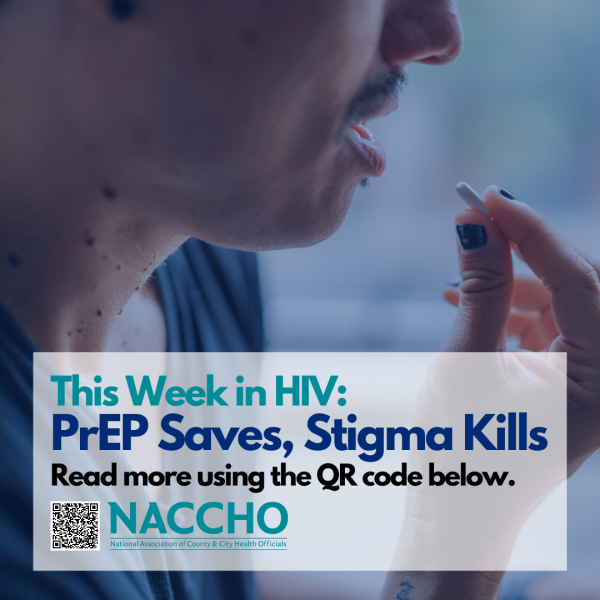July 16 marked the 11th anniversary of the FDA’s approval of PrEP for HIV prevention, a biomedical intervention that’s nearly 100% effective in preventing HIV infection when taken as prescribed.
PrEP means so much to so many: PrEP means the ability to live and love freely and without fear of acquiring HIV, and advancements in PrEP awareness mark huge progress towards eliminating HIV stigma and identity-based discrimination. Simply put, PrEP saves lives. Like much of the core public health work that LHDs engage in every day, PrEP also saves money: thanks to advances in generic medications, PrEP can cost as little as $240 per year. Comparatively, each new HIV diagnosis costs over $400,000 in direct lifetime health care spending.
PrEP is also a gateway to other important services regardless of one’s HIV status. Through community partnerships, PrEP providers and navigators often link clients to services supportive of sexual and drug user health, housing stability, health literacy, insurance navigation, primary care access, and more.
Despite 11 years on the market, though, PrEP is still not getting to the people who need it most. While as many as 78% of White individuals in need of PrEP are receiving it, only 11% of Black and 20% of Latinx individuals who most need PrEP are receiving it. (Learn more about your region’s PrEP-to-Need Ratio by visiting AIDSVu.org).
Meanwhile, the local public health infrastructure crucial for advancing HIV and PrEP equity is underfunded and understaffed: over 40% of surveyed LHDs report they lack adequate funding to support PrEP implementation in their jurisdictions. LHDs are key partners in community HIV prevention, treatment, detection, and response, but many face challenges in accessing staffing and resources to navigate the complex financing systems and payment assistance programs required to ensure PrEP availability for uninsured clients.
To address these gaps, NACCHO is a proud to be one of over 300 organizations supporting the creation of a National PrEP Program that would expand equitable access to this proven and effective HIV prevention medication and allow local public health providers to focus their efforts on reaching the communities that need PrEP the most. This community-led effort calls for infrastructure to cover the costs of PrEP for the uninsured and address further barriers leading to racial and gender disparities in PrEP utilization, with momentum to fund it growing exponentially in recent years.
Unfortunately, federal funding to support even existing PrEP access is at risk. The deal to suspend the debt limit earlier this year constrains funding availability for domestic public health priorities through fiscal year (FY) 2029, providing 5% less overall for non-defense discretionary programs in FY24. More drastic is the FY24 proposal by the Appropriations Committee Majority in the House of Representatives to severely cut critical public health funding supporting PrEP, including the complete elimination of the Ending the HIV Epidemic initiative (EHE). The proposed slashes to PrEP funding could lead to thousands of new HIV cases and billions in unnecessary costs for our healthcare system.
Importantly, the proposed funding cuts are far from final, and NACCHO and our partners are committed to amplifying the message that these cuts are unacceptable. For more information on the impacts of that proposed legislation on public health priorities broadly, see NACCHO’s blog covering the current status of the House FY24 appropriations bills.
Read more: NASTAD Condemns LHHS Appropriations Bill that Would Cut Millions from Vital HIV/AIDS Prevention and Treatment Programs
Moreover, cutting EHE funding hampers progress not only towards ending the HIV epidemic but also the broad syndemics of HIV, STIs, hepatitis C, and substance use disorders, interrelated conditions that are all exacerbated by similar social determinants of health and whose harms are all addressed by crucial and overlapping work of public health and community partners receiving funding through the EHE initiative. These proposed funding cuts come at the same time as the public health community is reeling from the abrupt ending of additional funding for disease investigation services (DIS), a core element of the HIV and STI workforce, as well as a federal court case out of Texas threatening to undermine PrEP and other preventive care coverage for insured individuals. Not all the news is bad, though. Thanks to tireless work by advocates, community members, public health practitioners, and the medical community, this year we’ve seen the Centers for Medicare & Medicaid Services (CMS) propose Medicare coverage of PrEP with no cost-sharing as well as the approval of over-the-counter (OTC) sales of birth control and overdose-reversing medication naloxone. Like PrEP, these two preventive medications benefit communities the most when available with low barriers and low costs. And the modernization of HIV criminalization laws in multiple states over the last five years continue to break down harmful stigma.
These wins can’t go unappreciated in face of the battles to come. Now, more than ever, the work of the public health and HIV communities to end HIV as an epidemic must focus on equitably advancing access to PrEP and reducing HIV stigma.
To learn more about #PrEPSaves and the ongoing efforts to fund a National PrEP Program, visit the websites of PrEP4All and its collaborators at AVAC, HIVMA, and the PrEP in Black America Coalition. Share your own insights on the importance of PrEP on social media using hashtags #PrEPSaves and #HIVPreventionDay!
Lastly, in light of Zero HIV Stigma Day on July 21, find and share resources from Let’s Stop HIV Together showing what to do when you witness HIV stigma. More social media toolkits to observe #ZeroHIVStigmaDay are available on HIV.gov.



